
Understanding Women’s Daily Nutritional Requirements: A Comprehensive Guide

By Aishakeel, 18 October 2023
Discover the essentials of women’s daily nutritional requirements, from macronutrients to special considerations, in our informative guide.
Women’s daily nutritional requirements are the foundation of a healthy and vibrant life. Whether you’re aiming for peak fitness, navigating pregnancy, or simply striving for overall wellness, understanding what your body needs is essential. In this concise guide, we’ll unlock the secrets of women’s daily nutritional needs, providing you with the knowledge to make informed choices for your well-being. Let’s dive in!
Table of Contents
Women’s Daily Nutritional Requirements at a glance
In this section, we will delve into the significance of nutrition for women, considering the role of age, lifestyle, and health goals, and explore the purpose of this comprehensive blog.
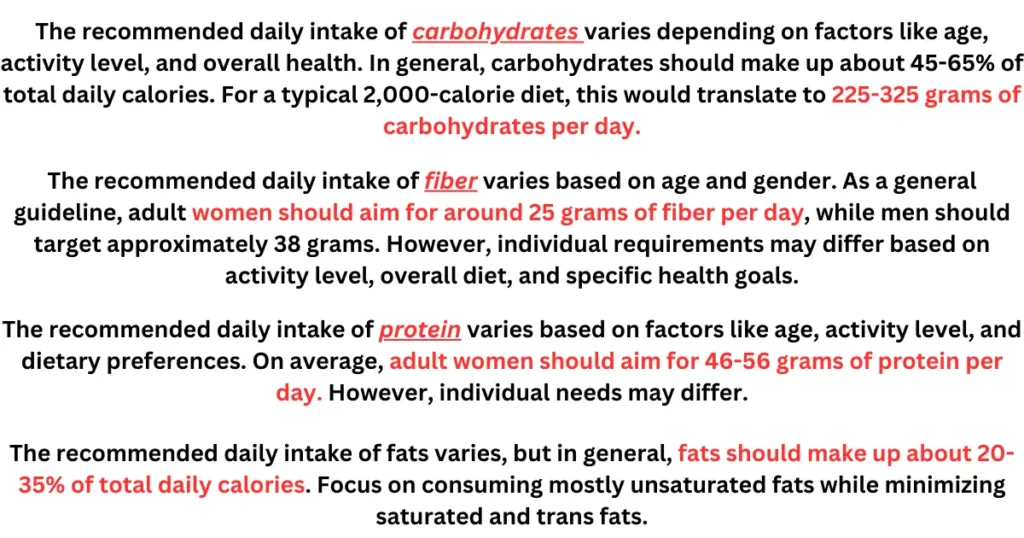
Importance of Proper Nutrition for Women
Physical Health
Nutrition is the fuel that powers the body. For women, a well-balanced diet provides essential nutrients that support overall physical health. This includes maintaining a healthy weight, reducing the risk of chronic diseases like heart disease and osteoporosis, and supporting reproductive health.
Mental and Emotional Well-being
Nutrient-rich foods have a direct impact on mental health and emotional stability. Proper nutrition can help regulate mood, reduce the risk of depression and anxiety, and improve cognitive function. It’s not just about looking good; it’s about feeling good too.
Hormonal Balance
Women’s bodies go through various hormonal changes throughout their lives, from puberty and menstruation to pregnancy, menopause, and beyond. Proper nutrition can help regulate hormone levels, alleviate PMS symptoms, and support a smoother transition through different life stages.
Fertility and Pregnancy
Nutrition plays a critical role in fertility and a healthy pregnancy. Adequate intake of key nutrients like folic acid, iron, and calcium can improve fertility and reduce the risk of birth defects and complications during pregnancy.
Bone Health
Women are more prone to osteoporosis, a condition characterized by fragile bones. Calcium and vitamin D intake, along with other nutrients, are crucial for maintaining strong bones throughout life.
Longevity and Aging Gracefully
Proper nutrition can contribute to a longer, healthier life. It can slow down the aging process, reduce the risk of age-related diseases, and promote overall longevity.
The Role of Age, Lifestyle, and Health Goals
Age, lifestyle, and individual health goals play a significant role in determining a woman’s nutritional requirements. These factors are not static and can change over time, making it essential to adapt one’s diet accordingly:
Age
Nutritional needs vary at different life stages. Adolescents need nutrients for growth and development, while women in their childbearing years require specific nutrients for fertility and pregnancy. As women age, the focus may shift towards bone health and managing menopausal symptoms.
Lifestyle
A woman’s lifestyle, including activity level, work, and dietary preferences, can greatly influence her nutritional needs. Athletes, for instance, require more calories and specific nutrients to support their training and recovery.
Health Goals
Individual health goals, such as weight management, managing chronic conditions like diabetes or hypertension, or adopting a vegetarian or vegan diet, can all impact nutritional choices. Understanding how nutrition fits into these goals is crucial for success.
Purpose of the Blog
The purpose of this comprehensive blog is to empower women with the knowledge and tools they need to make informed and health-conscious dietary choices. It serves as a valuable resource for women of all ages, lifestyles, and health goals, aiming to:
Educate
Provide evidence-based information on the nutritional needs of women at different life stages and under various circumstances.
Guide
Offer practical tips, meal plans, and dietary strategies to help women meet their unique nutritional requirements and achieve their health and wellness goals.
Debunk Myths
Address common nutrition myths and misconceptions to help women make informed decisions without falling victim to misinformation.
Promote Health and Well-being
Encourage a holistic approach to health by highlighting the interconnectedness of nutrition with mental, emotional, and physical well-being.
Support Self-care
Empower women to prioritize self-care and make choices that promote long-term health, vitality, and happiness.
As we explore the various aspects of women’s nutritional requirements in this blog, our goal is to provide women with the knowledge and resources they need to take charge of their health and make nutrition a cornerstone of their well-rounded approach to wellness.
Macronutrients
Macronutrients are the essential nutrients that provide energy and support various bodily functions. They include carbohydrates, proteins, and fats, each playing a unique role in a woman’s diet. In this section, we will explore macronutrients in detail, starting with carbohydrates, fiber, proteins, and fats.
Carbohydrates
Carbohydrates are a primary source of energy for the body and are categorized into two main types:
Simple Carbohydrates
These are composed of one or two sugar molecules and are quickly absorbed by the body.
Examples include glucose, fructose (found in fruits), and sucrose (table sugar).
Complex Carbohydrates
These consist of long chains of sugar molecules and take longer to digest.
Complex carbs are found in foods like whole grains, legumes, and vegetables.
Recommended Daily Intake
The recommended daily intake of carbohydrates varies depending on factors like age, activity level, and overall health. In general, carbohydrates should make up about 45-65% of total daily calories. For a typical 2,000-calorie diet, this would translate to 225-325 grams of carbohydrates per day.
Sources of Healthy Carbohydrates
Consuming healthy carbohydrates is essential for maintaining stable energy levels and overall health. Some sources of healthy carbohydrates include:
- Whole Grains: Foods like brown rice, quinoa, whole wheat pasta, and oats are rich in fiber and nutrients.
- Legumes: Beans, lentils, and chickpeas are excellent sources of complex carbohydrates, fiber, and plant-based protein.
- Fruits: Choose whole fruits like apples, berries, and oranges for their natural sugars and fiber content.
- Vegetables: Non-starchy vegetables such as broccoli, spinach, and bell peppers are low in calories and high in fiber.
Fiber: A Vital Component of Carbohydrates
Fiber is an essential but often underestimated component of carbohydrates. It plays a crucial role in maintaining overall health and should be an integral part of your daily nutritional intake. Let’s delve into the importance of fiber, its types, recommended daily intake, and sources.
The Importance of Fiber
Fiber, often referred to as “roughage,” is the indigestible part of plant foods. While it may not provide calories or nutrients, its benefits are profound:
Digestive Health: Fiber aids in regular bowel movements, preventing constipation and promoting a healthy gut.
Blood Sugar Control: Soluble fiber can slow the absorption of sugar, helping to stabilize blood sugar levels.
Weight Management: High-fiber foods tend to be more filling, reducing overall calorie intake and aiding in weight management.
Heart Health: A high-fiber diet can lower cholesterol levels and reduce the risk of heart disease.
Types of Fiber
There are two main types of dietary fiber:
1. Soluble Fiber
Dissolves in water and forms a gel-like substance in the digestive tract. It can help lower cholesterol and stabilize blood sugar. Sources include oats, beans, fruits, and vegetables.
2. Insoluble Fiber
Does not dissolve in water and adds bulk to the stool. It aids in regular bowel movements and prevents constipation. Sources include whole grains, nuts, and vegetables like broccoli.
Recommended Daily Intake
The recommended daily intake of fiber varies based on age and gender. As a general guideline, adult women should aim for around 25 grams of fiber per day, while men should target approximately 38 grams. However, individual requirements may differ based on activity level, overall diet, and specific health goals.
Sources of Dietary Fiber
To meet your daily fiber requirements, incorporate the following high-fiber foods into your diet:
Whole Grains: Opt for whole-grain bread, brown rice, quinoa, and whole-grain pasta over refined grains.
Legumes: Beans, lentils, and chickpeas are rich sources of fiber.
Fruits: Berries, apples, pears, and oranges are excellent choices.
Vegetables: Broccoli, carrots, spinach, and Brussels sprouts are high in fiber.
Nuts and Seeds: Almonds, chia seeds, and flaxseeds are fiber-packed options.
Oats: Start your day with a bowl of oatmeal for a fiber boost.
Remember that increasing your fiber intake gradually and drinking plenty of water is essential to prevent digestive discomfort. Fiber is a vital component of a balanced diet, contributing to overall well-being and long-term health.
Proteins
Importance of Protein for Women
Protein is a crucial macronutrient for women because it supports various functions in the body, including:
- Muscle Maintenance: Protein helps build and repair muscle tissue, which is essential for overall strength and health.
- Hormone Production: Proteins play a role in synthesizing hormones, enzymes, and neurotransmitters.
- Immune Function: The antibodies that defend the body against infections are made of proteins.
- Hair and Skin Health: Proteins are vital for maintaining healthy hair and skin.
Recommended Daily Intake
The recommended daily intake of protein varies based on factors like age, activity level, and dietary preferences. On average, adult women should aim for 46-56 grams of protein per day. However, individual needs may differ.
Sources of Lean Protein
Incorporating lean protein sources into the diet is important for women looking to maintain or build muscle and support overall health. Some sources of lean protein include:
- Poultry: Skinless chicken and turkey are low in fat and high in protein.
- Fish: Fatty fish like salmon and trout provide protein and heart-healthy omega-3 fatty acids.
- Lean Meats: Choose cuts of beef and pork that are low in fat, such as sirloin or tenderloin.
- Plant-Based Proteins: Tofu, tempeh, edamame, and legumes like beans and lentils are excellent sources of plant-based protein.
Fats
Not all fats are created equal. There are three main types of dietary fats:
Saturated Fats
These fats are typically solid at room temperature and are found in animal products like butter, fatty cuts of meat, and full-fat dairy. Limiting saturated fat intake is important for heart health.
Monounsaturated Fats
Found in olive oil, avocados, and nuts, these fats are considered heart-healthy and can help reduce bad cholesterol levels.
Polyunsaturated Fats
Sources include fatty fish (like salmon and mackerel), flaxseeds, and walnuts. These fats contain essential omega-3 and omega-6 fatty acids, which are important for brain and heart health.
Recommended Daily Intake
The recommended daily intake of fats varies, but in general, fats should make up about 20-35% of total daily calories. Focus on consuming mostly unsaturated fats while minimizing saturated and trans fats.
Sources of Healthy Fats
Including healthy fats in the diet can provide various health benefits. Sources of healthy fats include:
- Avocados: Rich in monounsaturated fats, avocados are great for heart health and provide vitamins and fiber.
- Nuts and Seeds: Almonds, walnuts, chia seeds, and flaxseeds are nutrient-dense sources of healthy fats.
- Olive Oil: Extra virgin olive oil is a staple in Mediterranean diets and offers numerous health benefits.
- Fatty Fish: Salmon, mackerel, and sardines are packed with omega-3 fatty acids, which support heart and brain health.
Incorporating a balanced mix of carbohydrates, proteins, and fats into your daily diet is essential for meeting your nutritional needs and promoting overall health and well-being. Understanding the types of macronutrients and their roles empowers women to make informed dietary choices that align with their health goals.
Micronutrients
Micronutrients are essential vitamins and minerals that the body requires in relatively small amounts but are crucial for various physiological functions. They play a vital role in maintaining health, supporting growth, and preventing deficiency-related diseases.
Vitamins
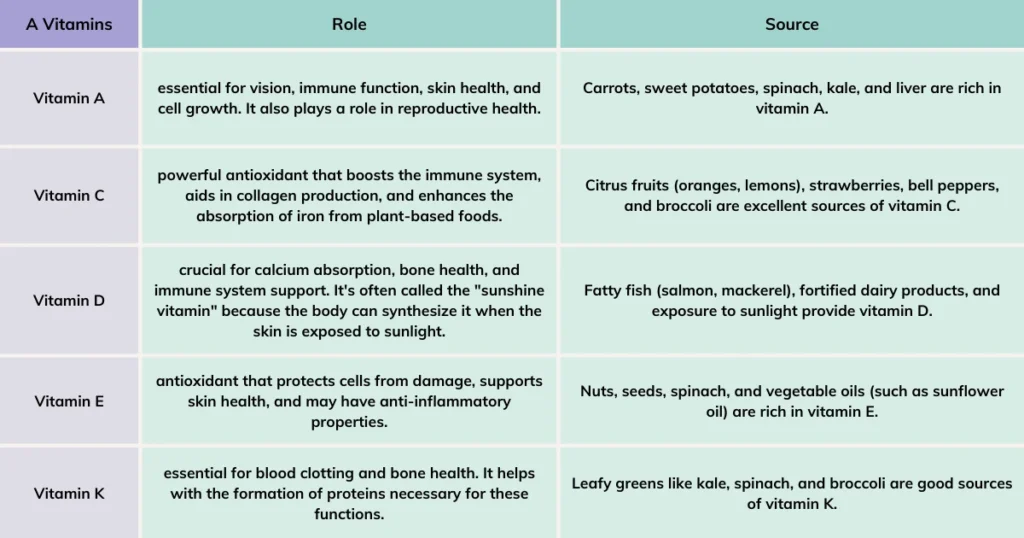
B Vitamins
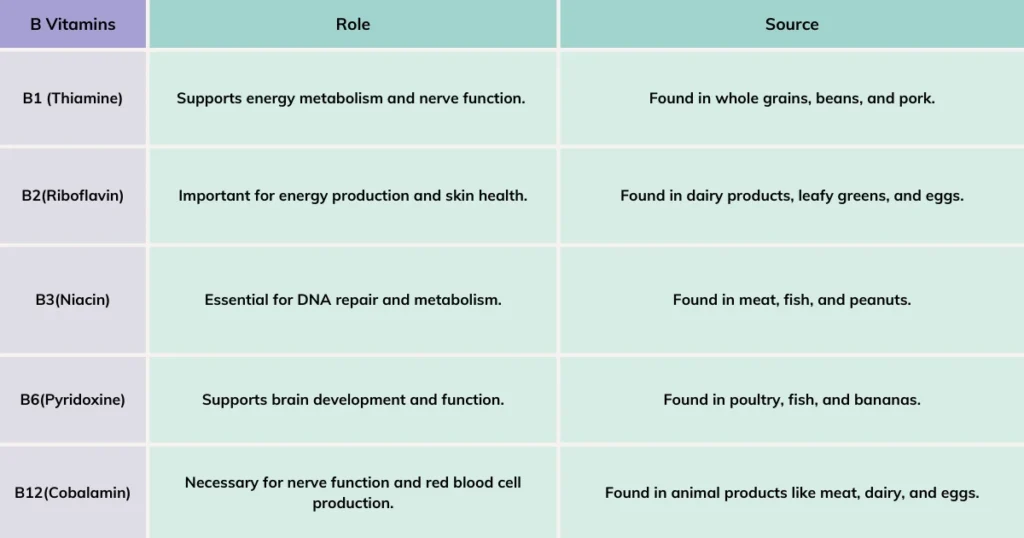
Minerals
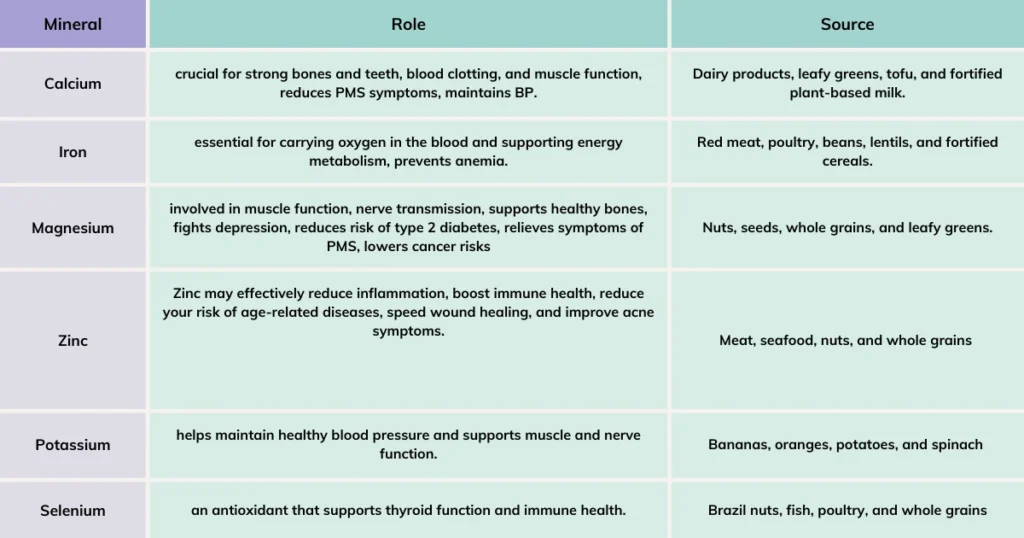
Understanding the importance of vitamins and minerals and incorporating a variety of nutrient-rich foods into your diet is essential for maintaining optimal health and preventing micronutrient deficiencies. A balanced and diverse diet ensures that you meet your daily requirements for these essential micronutrients, supporting your overall well-being.
Special Considerations
Special considerations in nutrition are essential to address the unique needs of different life stages and dietary preferences. In this section, we will explore three key areas of special consideration: Pregnancy and Lactation, Menopause, and Vegetarian and Vegan Diets.
Pregnancy and Lactation
Increased Nutritional Needs
Pregnancy and lactation are periods of increased nutritional demand for women. The growing fetus and the production of breast milk require additional nutrients.
Key Nutrients for Expecting and Nursing Mothers
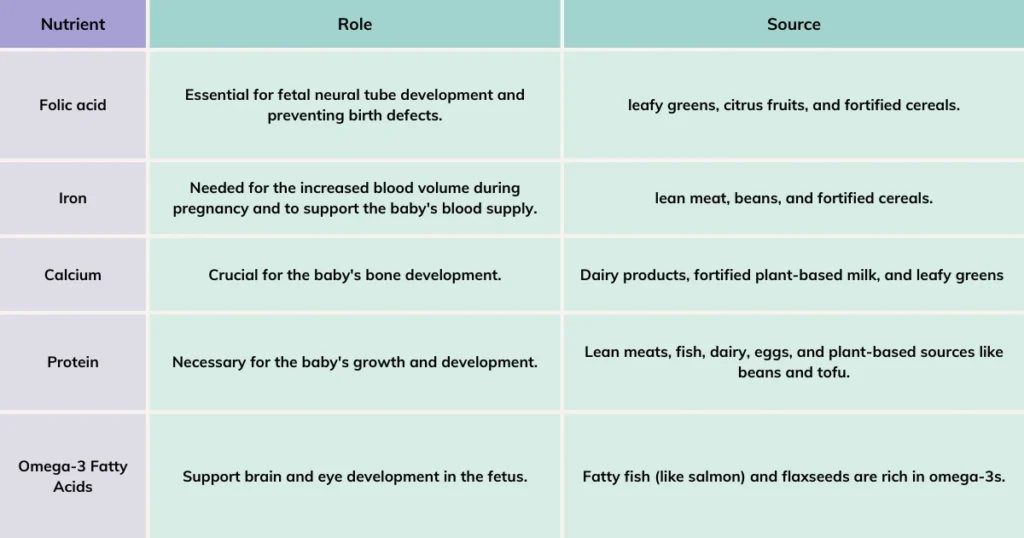
Key nutrients that need to be emphasized during the phases of pregnancy and lactation
Menopause
Nutritional Changes During Menopause
Menopause is a natural biological process marking the end of a woman’s reproductive years. It brings about hormonal changes that can impact nutrition and health:
- Bone Health: Decreased estrogen levels can lead to bone loss, making calcium and vitamin D intake crucial.
- Heart Health: Changes in metabolism may increase the risk of heart disease, emphasizing the importance of a heart-healthy diet.
- Weight Management: Hormonal changes can affect weight, so portion control and regular physical activity are vital.
- Mood and Sleep: Nutrients like B vitamins and omega-3 fatty acids may support mood and sleep quality.
Maintaining Bone Health
- Calcium: Continue to consume calcium-rich foods or supplements as needed.
- Vitamin D: Ensure adequate vitamin D intake for calcium absorption.
- Magnesium: Supports bone health and is found in nuts, seeds, and whole grains.
- Weight-Bearing Exercise: Regular weight-bearing exercises like walking or strength training can help maintain bone density.
Vegetarian and Vegan Diets
Meeting Nutritional Needs Without Animal Products
Vegetarian and vegan diets can be healthy if well-planned to ensure all essential nutrients are obtained:
- Protein: Incorporate plant-based protein sources like beans, lentils, tofu, tempeh, and quinoa to meet daily protein requirements.
- Iron: Include iron-rich foods like fortified cereals, lentils, and leafy greens. Pair with vitamin C-rich foods to enhance absorption. Monitor iron levels and, if needed, consider iron supplements with a healthcare provider’s guidance.
- Vitamin B12: Consume B-12 fortified foods regularly or take B12 supplements, as it is primarily found in animal products.
- Calcium and Vitamin D: Choose calcium-fortified plant-based milk and leafy greens. Ensure sufficient intake through fortified foods or supplements if necessary.
- Omega-3 Fatty Acids: Include flaxseeds, chia seeds, and walnuts in your diet.
In summary, special nutritional considerations are essential for women during pregnancy and lactation, menopause, and when following vegetarian or vegan diets. Understanding the unique needs and potential challenges associated with these life stages or dietary preferences allows women to make informed choices that support their health and well-being. Consulting with a healthcare provider or registered dietitian can provide personalized guidance in these special situations.
Hydration
Hydration is a fundamental aspect of maintaining good health and well-being. It involves maintaining the right balance of water in your body to support various physiological functions. In this section, we will explore the importance of staying hydrated, daily water intake recommendations, and hydration tips.
Importance of Staying Hydrated
Cellular Function: Water is essential for the proper functioning of cells. It serves as a medium for biochemical reactions and helps transport nutrients and oxygen to cells while removing waste products.
Temperature Regulation: Sweating is the body’s natural mechanism for cooling down. Adequate hydration helps regulate body temperature and prevent overheating.
Digestion and Nutrient Absorption: Water is necessary for the digestion of food and the absorption of nutrients in the gastrointestinal tract.
Joint Lubrication: Adequate hydration helps maintain joint health by keeping cartilage lubricated.
Cognitive Function: Dehydration can impair cognitive function, leading to difficulty concentrating, reduced alertness, and memory problems.
Kidney Function: The kidneys rely on adequate fluid intake to filter waste products and toxins from the blood and produce urine.
Daily Water Intake Recommendations
The daily water intake recommendations can vary depending on factors like age, gender, activity level, climate, and individual health. However, a general guideline for adults is to aim for about 8-10 cups (64-80 ounces) of water per day. This includes all beverages and moisture content in foods.
Specific recommendations
- Men: About 3.7 liters (or about 15 cups) of total water intake per day.
- Women: About 2.7 liters (or about 11 cups) of total water intake per day. These recommendations are a baseline and can be adjusted based on individual needs. Factors that may increase your need for water include:
- Hot Weather: You may need more water to stay hydrated in hot and humid conditions.
- Physical Activity: Exercise increases water loss through sweat, so you’ll need to drink more to compensate.
- Pregnancy and Breastfeeding: Expecting and nursing mothers require additional fluids.
Hydration Tips
To stay properly hydrated and meet your daily water intake recommendations, consider the following tips:
Listen to Your Body: Pay attention to your body’s thirst signals. If you’re thirsty, it’s a sign that you need to drink more water.
Carry a Reusable Water Bottle: Having a water bottle with you makes it easy to sip throughout the day, whether you’re at work, running errands, or exercising.
Set Reminders: Use phone apps or alarms to remind yourself to drink water at regular intervals.
Monitor Urine Color: Pale, straw-colored urine is a good indicator of adequate hydration. Dark yellow or amber urine may suggest dehydration.
Incorporate Hydrating Foods: Fruits and vegetables with high water content, such as watermelon, cucumber, and oranges, can contribute to your daily fluid intake.
Limit Caffeine and Alcohol: Both caffeine and alcohol can have diuretic effects, meaning they may increase fluid loss. Balance their consumption with extra water.
Drink Before and After Exercise: Hydrate before, during, and after physical activity to replace lost fluids and electrolytes.
Consider Electrolyte Drinks: For prolonged or intense exercise, electrolyte drinks can help replenish lost minerals along with fluids.
Be Mindful of Special Needs: Pregnant and breastfeeding women, older adults, and individuals with certain medical conditions may have unique hydration needs. Consult with a healthcare provider for personalized advice.
In conclusion, staying adequately hydrated is essential for overall health and well-being. Understanding the importance of hydration, knowing your daily water intake needs, and implementing hydration tips can help you maintain optimal fluid balance and support your body’s functions.
Meal Planning and Balanced Diet
Meal planning and maintaining a balanced diet are critical components of a healthy lifestyle. They help ensure that you get the right nutrients in the right proportions to support your overall health and well-being. In this section, we will explore the principles of building a balanced plate, the importance of portion control, the Mediterranean diet as a healthy option, and provide sample meal plans for women.
Building a Balanced Plate
Creating a balanced plate means including a variety of foods from different food groups to ensure you get a wide range of nutrients.
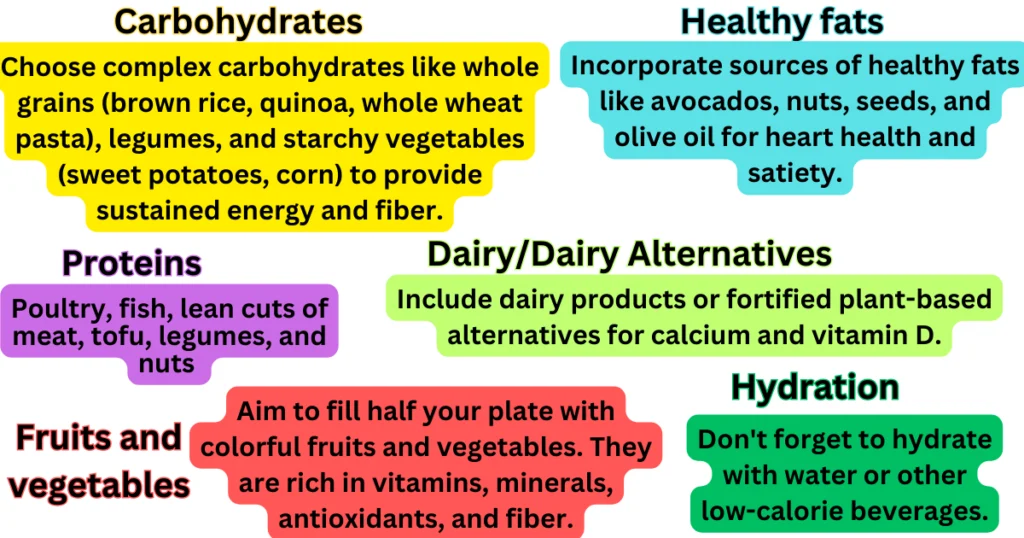
Portion Control
Portion control is essential to prevent overeating and manage your weight. Here are some tips for managing portion sizes:
Use Smaller Plates: Smaller plates can help trick your mind into thinking you’re eating more than you are.
Mindful Eating: Pay attention to your hunger and fullness cues. Eat slowly and savor your food to avoid overeating.
Read Labels: Learn to read food labels to understand serving sizes and nutrient content.
Pre-Portion Snacks: Instead of eating directly from a large bag or container, portion out snacks into smaller servings to prevent mindless eating.
Share or Save Leftovers: When dining out, consider sharing a meal or saving half for later.
Carbohydrates are a primary source of energy for the body and are categorized into two main types:
Simple Carbohydrates
These are composed of one or two sugar molecules and are quickly absorbed by the body.
Examples include glucose, fructose (found in fruits), and sucrose (table sugar).
Complex Carbohydrates
These consist of long chains of sugar molecules and take longer to digest.
Complex carbs are found in foods like whole grains, legumes, and vegetables.
Recommended Daily Intake
The recommended daily intake of carbohydrates varies depending on factors like age, activity level, and overall health. In general, carbohydrates should make up about 45-65% of total daily calories. For a typical 2,000-calorie diet, this would translate to 225-325 grams of carbohydrates per day.
Sources of Healthy Carbohydrates
Consuming healthy carbohydrates is essential for maintaining stable energy levels and overall health. Some sources of healthy carbohydrates include:
- Whole Grains: Foods like brown rice, quinoa, whole wheat pasta, and oats are rich in fiber and nutrients.
- Legumes: Beans, lentils, and chickpeas are excellent sources of complex carbohydrates, fiber, and plant-based protein.
- Fruits: Choose whole fruits like apples, berries, and oranges for their natural sugars and fiber content.
- Vegetables: Non-starchy vegetables such as broccoli, spinach, and bell peppers are low in calories and high in fiber.
The Mediterranean Diet: A Healthy Option
The Mediterranean diet is often hailed as one of the healthiest diets globally and is characterized by:
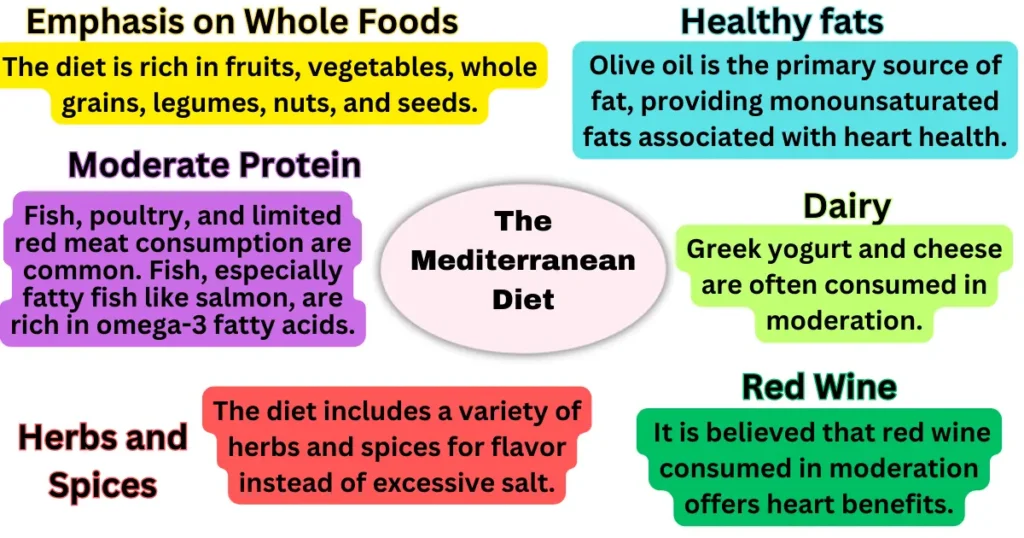
The characteristic components of the Mediterranean Diet
The Mediterranean diet has numerous health benefits, including reduced risk of heart disease, improved weight management, and better cognitive function.
Sample Meal Plans for Women
Here are two sample meal plans for women to give you an idea of how to structure balanced meals:
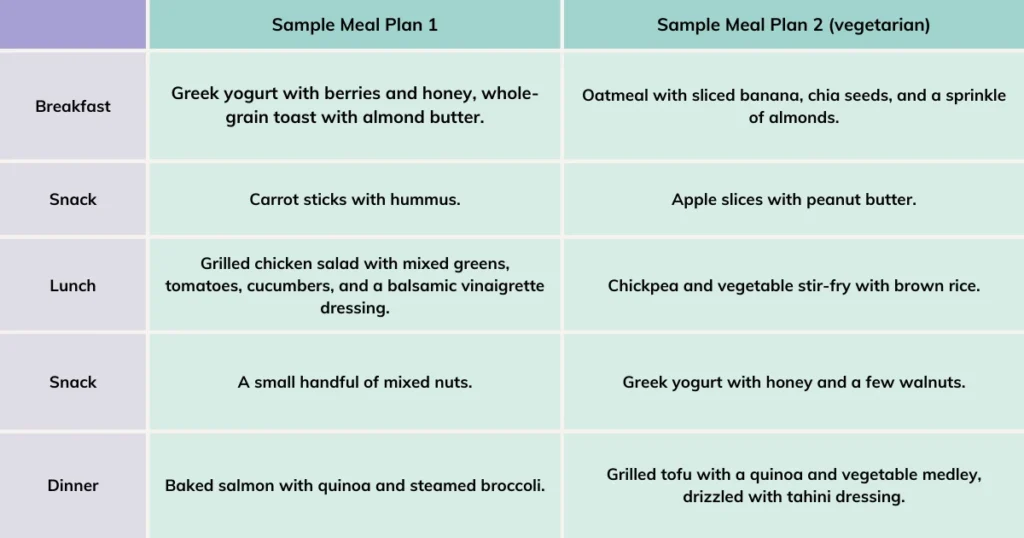
These sample meal plans are just examples, and individual dietary needs may vary. It’s essential to customize your meal plan to meet your specific nutritional requirements, preferences, and dietary restrictions. Consulting with a registered dietitian can provide personalized guidance and help you create a balanced diet that suits your unique needs and goals.
Common Dietary Myths and Misconceptions
In the world of nutrition, there is no shortage of myths and misconceptions that can lead people astray when it comes to making healthy food choices. In this section, we will explore some of the most common dietary myths and misconceptions, debunk them with evidence-based information, and clarify the misinformation surrounding weight loss.
Busting Nutrition Myths
Myth: All Fats Are Unhealthy
This myth oversimplifies the role of fats in the diet. While trans fats and excessive saturated fats can be harmful, healthy fats like monounsaturated and polyunsaturated fats (found in avocados, nuts, and fatty fish) are essential for overall health.
Myth: Carbohydrates Make You Gain Weight
Carbohydrates are not inherently fattening. Excess calories from any macronutrient can contribute to weight gain. Focus on whole, complex carbohydrates like whole grains and legumes for sustained energy and health.
Myth: Gluten-Free Diets Are Healthier for Everyone
Gluten-free diets are necessary for individuals with celiac disease or gluten sensitivity. For others, there is no health benefit to avoiding gluten and doing so may limit the variety of nutrients in their diet.
Myth: You Should Detox or Cleanse Regularly
The human body has its built-in detoxification systems (the liver and kidneys). There is no scientific evidence to support the need for detox diets or cleanses. A balanced diet with plenty of water supports these natural processes.
Myth: Eating Late at Night Causes Weight Gain
The timing of your meals matters less than the total daily calories you consume. Weight gain is primarily determined by overall calorie intake versus expenditure.
Clarifying Misinformation About Weight Loss
Misconception: Rapid Weight Loss is Sustainable
Crash diets or extreme weight loss methods may lead to quick results, but they are not sustainable. Gradual, steady weight loss is more likely to lead to long-term success.
Misconception: Calories Are the Only Factor in Weight Loss
While calories are important, the quality of those calories matters too. Nutrient-dense foods, such as whole grains, lean proteins, and fruits and vegetables, can help you feel full and satisfied while supporting weight loss.
Misconception: Skipping Meals Helps with Weight Loss
Skipping meals can lead to overeating later in the day and may slow down your metabolism. Regular, balanced meals and snacks can help control hunger and promote weight loss.
Misconception: All Weight Loss Supplements are Safe and Effective
Many weight loss supplements on the market are unregulated and can have harmful side effects. It’s best to rely on a balanced diet and exercise for weight management, under the guidance of a healthcare provider if necessary.
Misconception: You Must Exercise Excessively to Lose Weight
While exercise is crucial for overall health, extreme exercise regimens are not necessary for weight loss. Consistent, moderate exercise combined with a healthy diet can lead to sustainable weight loss.
It’s important to base your dietary choices and weight management strategies on sound scientific evidence rather than falling victim to common myths and misconceptions. Consult with a registered dietitian or healthcare provider for personalized guidance tailored to your individual needs and goals. Remember that a balanced, sustainable approach to nutrition and weight management is key to long-term success.
Special Diets and Health Conditions
Special diets tailored to specific health conditions play a crucial role in managing and improving overall well-being. In this section, we will discuss three common health conditions and the dietary strategies associated with them: Diabetes, Heart Health, and Weight Management.
Diabetes
Managing Blood Sugar Levels
Diabetes is a condition characterized by elevated blood sugar levels.
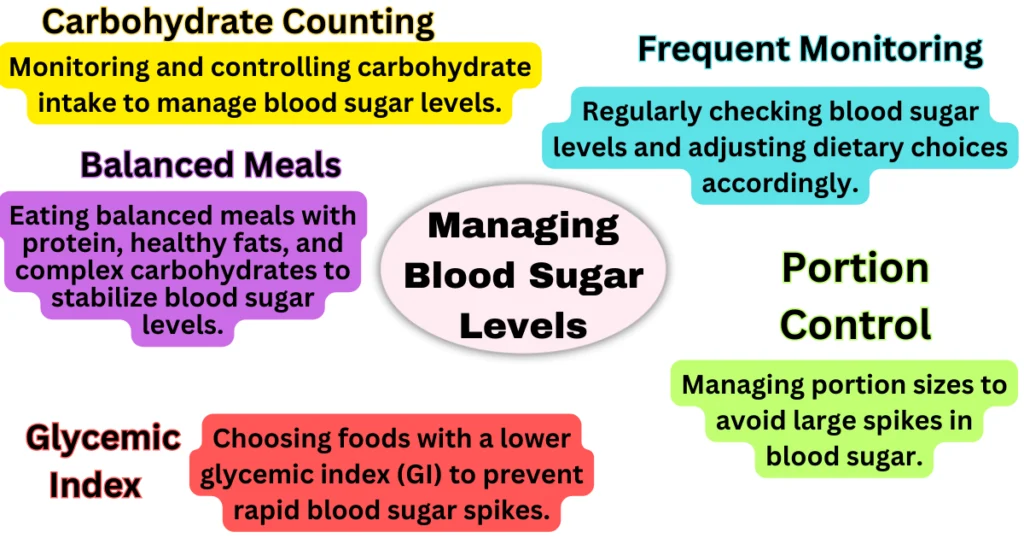
Recommended Dietary Modifications
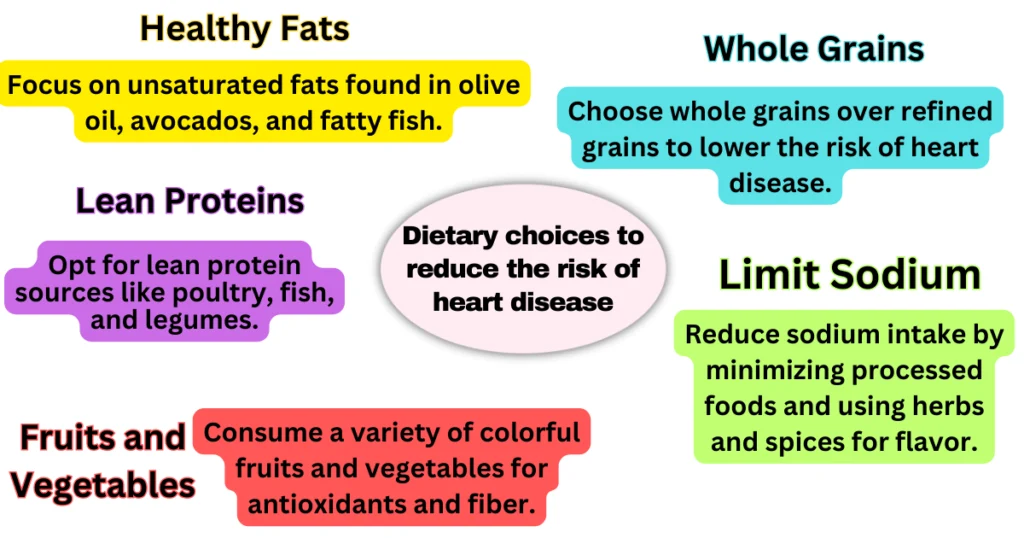
Heart Health
Dietary Strategies for a Healthy Heart

Lowering Cholesterol and Blood Pressure
- Omega-3 Fatty Acids Incorporate fatty fish like salmon, flaxseeds, and walnuts to help lower cholesterol.
- Soluble Fiber Foods like oats, beans, and lentils can help reduce cholesterol levels.
- Potassium Increase potassium intake by eating bananas, oranges, and leafy greens to support healthy blood pressure.
Weight Management
Strategies for Healthy Weight Maintenance
- Balanced Diet Consume a variety of foods from all food groups in appropriate portion sizes.
- Regular Exercise Engage in regular physical activity to support weight management and overall health.
- Mindful Eating Pay attention to hunger and fullness cues to avoid overeating.
- Slow, Sustainable Changes Avoid extreme diets and focus on gradual, sustainable lifestyle changes.
Avoiding Fad Diets
Fad diets often promise quick results but can be detrimental to your health in the long term:
- Unsustainability Fad diets are often too restrictive and challenging to maintain over time.
- Nutrient Deficiencies They may lack essential nutrients, leading to deficiencies.
- Metabolic Damage Extreme diets can slow down metabolism, making it harder to lose weight in the future.
It’s essential to consult with a healthcare provider or registered dietitian when managing health conditions or pursuing weight management goals. They can provide personalized guidance and create a tailored dietary plan that aligns with your specific needs and health objectives. Maintaining a balanced and sustainable approach to nutrition is key to long-term success and overall well-being.
Supplements
Supplements are products designed to provide essential nutrients that may be lacking in your diet or needed in higher quantities due to specific health conditions or life stages. In this section, we will discuss when supplements may be necessary, how to choose high-quality supplements, and commonly recommended supplements for women.
When Supplements May Be Necessary
Nutrient Deficiencies
Supplements may be necessary when there are clear deficiencies in essential vitamins or minerals. Common deficiencies include vitamin D, vitamin B12, iron, and calcium.
Pregnancy and Lactation
Pregnant and breastfeeding women often require additional nutrients like folic acid, iron, and calcium to support fetal development and lactation.
Medical Conditions
Certain medical conditions, such as celiac disease, Crohn’s disease, or malabsorption disorders, can hinder nutrient absorption, necessitating supplements.
Vegans and Vegetarians
Individuals on plant-based diets may need vitamin B12 supplements, as this vitamin is primarily found in animal products.
Age-Related Needs
Older adults may require supplements of vitamin D and calcium to support bone health.
Athletes and Intensive Training
Athletes with intense training regimens may need supplements like protein or branched-chain amino acids to support muscle recovery and growth.
Choosing High-Quality Supplements
Consult a Healthcare Provider
Before starting any supplement regimen, consult with a healthcare provider or registered dietitian. They can assess your specific needs and recommend appropriate supplements.
Look for Third-Party Testing
Choose supplements from reputable brands that undergo third-party testing for quality and purity. Look for seals like USP, NSF, or ConsumerLab.
Read Labels Carefully
Pay attention to the ingredient list and dosage information. Ensure that the supplement provides the recommended daily allowance (RDA) or the dose recommended by your healthcare provider.
Avoid Excessive Dosages
Taking excessive doses of vitamins and minerals can be harmful. Stick to recommended dosages unless advised otherwise by a healthcare provider.
Consider Bioavailability
Some forms of nutrients are more easily absorbed by the body than others. Look for supplements with highly bioavailable forms of nutrients when available.
Check for Interactions
Some supplements can interact with medications or other supplements you may be taking. Discuss potential interactions with your healthcare provider.
Commonly Recommended Supplements for Women
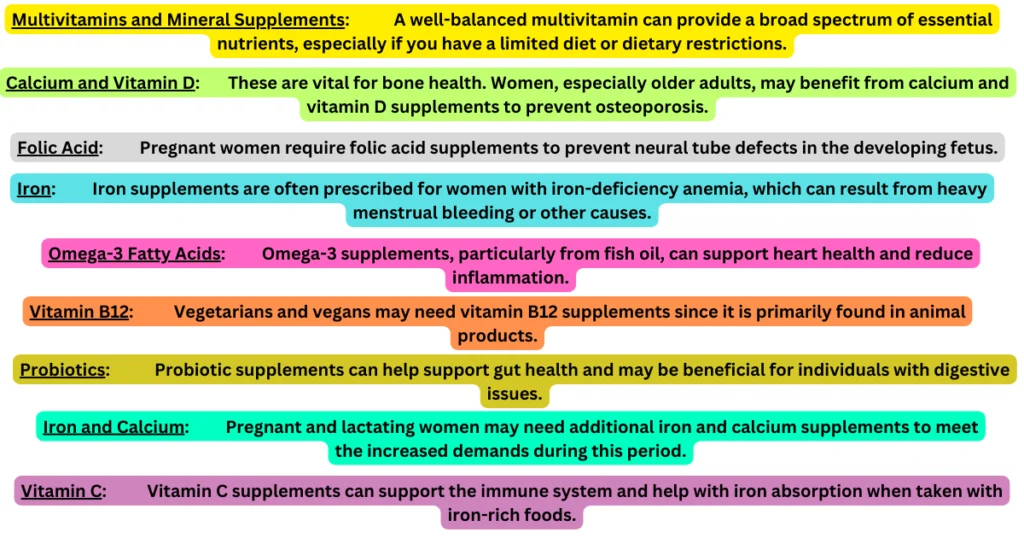
Remember that supplements are meant to complement a balanced diet, not replace it. It’s best to obtain most of your nutrients from whole foods whenever possible. Consulting with a healthcare provider or registered dietitian will help ensure that you choose the right supplements and use them effectively to support your health and well-being.
Lifestyle and Nutrition
The connection between lifestyle and nutrition is profound, as the choices you make in your daily life can significantly impact your overall health and well-being. In this section, we will explore the interplay between nutrition and various lifestyle factors, including exercise, stress, emotional eating, and sleep.
Exercise and Nutrition
Exercise as a Complement to Nutrition
Exercise and nutrition go hand in hand to promote overall health. Regular physical activity supports weight management, improves metabolic health, and enhances mood. When combined with a balanced diet, exercise can be a powerful tool for achieving and maintaining optimal well-being.
Pre-Exercise Nutrition
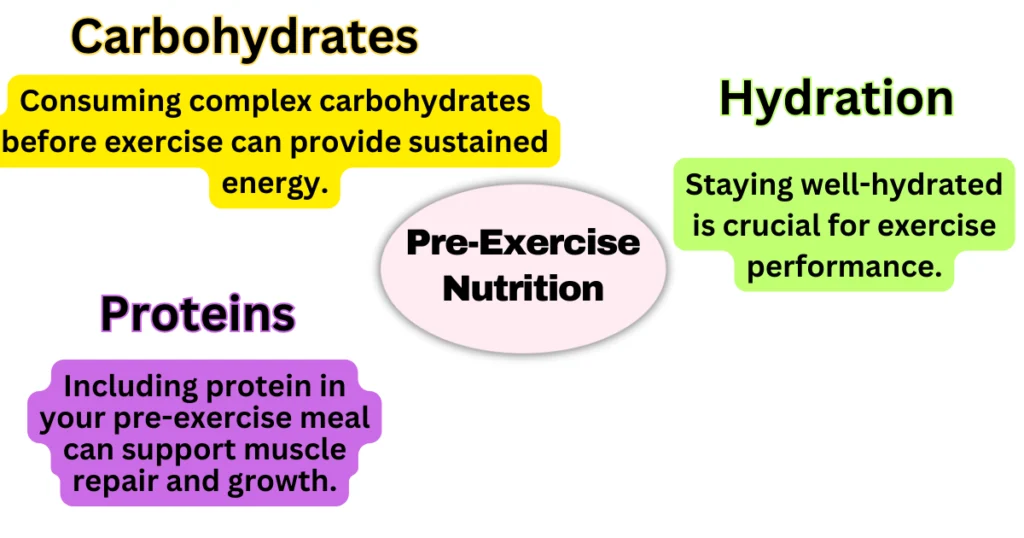
Nutrients to take before exercise
Post-Exercise Nutrition
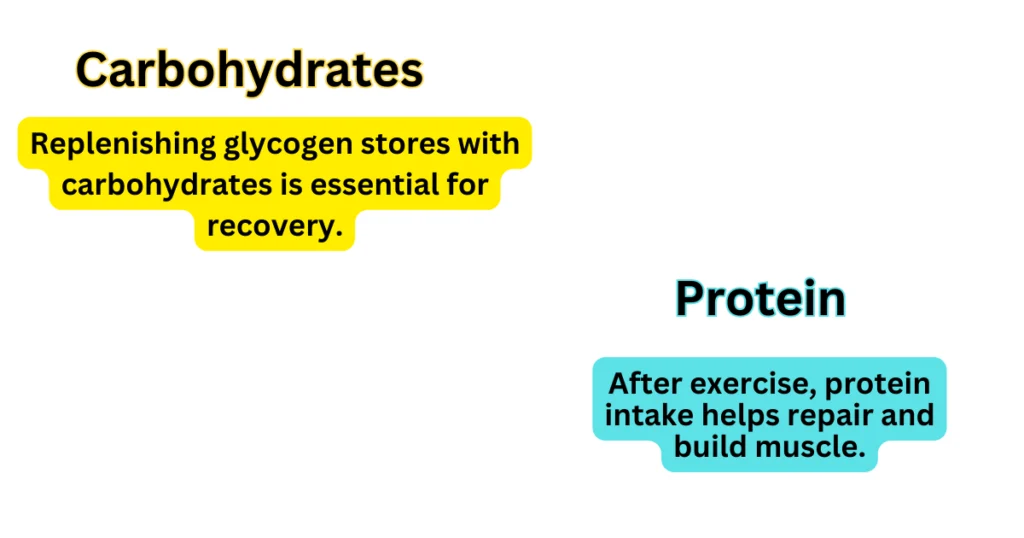
Nutrients to take after exercise
Balancing Calories
While exercise can increase calorie expenditure, it’s essential to balance this with appropriate calorie intake to avoid overeating or undereating.
Stress and Emotional Eating
Stress and Its Impact on Eating Habits
- Stress can lead to changes in eating habits, such as emotional eating or cravings for comfort foods.
- Chronic stress can contribute to weight gain and make it challenging to maintain a balanced diet.
Strategies to Manage Stress-Induced Eating
- Mindfulness Practice mindfulness techniques to become more aware of emotional eating triggers.
- Stress Reduction Engage in stress-reduction activities like yoga, meditation, or deep breathing exercises.
- Healthy Coping Mechanisms Seek healthy ways to manage stress, such as exercise or talking to a counselor.
Mindful Eating
Mindful eating involves paying full attention to the sensory experience of eating and being in tune with hunger and fullness cues. It can help prevent overeating due to stress or emotions.
Sleep and Its Impact on Dietary Choices
The Sleep-Nutrition Connection
- Inadequate sleep can disrupt hormonal balance, leading to increased appetite, especially for high-calorie, sugary foods.
- Sleep deprivation can reduce the body’s ability to regulate blood sugar, potentially contributing to insulin resistance and weight gain.
Tips for Better Sleep and Dietary Choices
- Consistent Sleep Schedule Maintain a regular sleep schedule to regulate your body’s internal clock.
- Sleep Environment Create a comfortable, dark, and quiet sleep environment.
- Limit Screen Time Avoid screens (phones, tablets, TVs) before bedtime, as the blue light can interfere with sleep.
Avoid Late-Night Eating
Consuming heavy or high-calorie meals close to bedtime can disrupt sleep and digestion. It’s best to finish eating at least a few hours before bedtime.
Caffeine and Alcohol
Limit caffeine and alcohol intake, especially in the evening, as they can disrupt sleep patterns.
Balanced Evening Snacks
If you need a snack before bed, opt for balanced options like a small serving of yogurt with berries or a piece of whole-grain toast with peanut butter to avoid sleep disturbances.
In summary, lifestyle factors such as exercise, stress management, emotional eating, and sleep quality all play a significant role in your nutritional choices and overall health. Recognizing the connections between these aspects of your life and making conscious efforts to maintain a balanced lifestyle can lead to better dietary choices, improved well-being, and enhanced quality of life.
Conclusion
As we conclude this comprehensive guide to women’s nutrition, it’s essential to recap the key takeaways, offer encouragement for maintaining a healthy diet, and stress the importance of seeking professional guidance when needed.
Recap of Key Takeaways
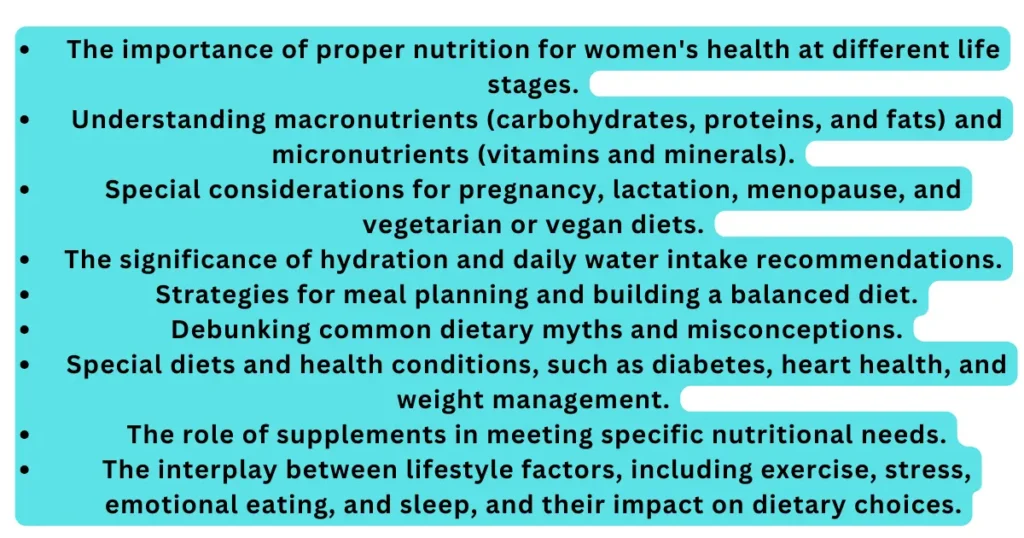
Recap of topics related to women’s nutrition
Encouragement for Maintaining a Healthy Diet
Maintaining a healthy diet is a lifelong journey that can greatly influence your overall health, well-being, and quality of life. Here are some words of encouragement to help you stay on track:
Consistency Matters
Consistently making balanced food choices and practicing healthy habits are key to long-term success. Small, sustainable changes can lead to significant improvements in your health over time.
Listen to Your Body
Pay attention to your body’s signals of hunger, fullness, and cravings. Eating mindfully can help you make more conscious food choices.
Stay Informed
Nutrition is a dynamic field with ongoing research. Stay informed about the latest findings and adapt your diet as needed to align with current best practices.
Seek Support
Surround yourself with a supportive community of friends and family who encourage your healthy eating goals. Share your journey with them.
Celebrate Progres
Celebrate your achievements, whether they are small or large. Acknowledging your successes can provide motivation to continue.
Seeking Professional Guidance
While this guide provides valuable information, it’s important to remember that every individual has unique dietary needs and considerations. If you have specific health concerns, medical conditions, or dietary preferences, it’s highly recommended that you seek professional guidance:
Registered Dietitians
Consult with a registered dietitian, a qualified expert in nutrition, for personalized advice and guidance tailored to your specific needs and goals.
Healthcare Providers
Discuss any health concerns or medical conditions with your healthcare provider. They can help you manage and address health issues through dietary and lifestyle changes.
Nutritional Counseling
Consider nutritional counseling for specialized guidance, particularly if you have complex dietary requirements.
In conclusion, prioritizing your nutrition is a powerful way to enhance your health, energy, and vitality as a woman. Remember that achieving and maintaining a healthy diet is a journey, not a destination. By making informed choices, practicing balance, and seeking professional guidance when necessary, you can enjoy the benefits of a nourishing diet and live a healthier, more fulfilling life.
Additional Resources
To further support your journey toward better women’s nutrition, there are numerous valuable resources available, including books, websites, professional services, and online tools. In this section, we’ll explore these resources to help you access reliable information and expert guidance.
Books and Websites
Books
- “The Women’s Health Big Book of Food & Nutrition” by Joel Weber, Deirdre Rawlings, and Editors of Women’s Health Magazine.
- “The Whole30: The 30-Day Guide to Total Health and Food Freedom” by Melissa Hartwig and Dallas Hartwig.
- “Eating on the Wild Side: The Missing Link to Optimum Health” by Jo Robinson.
- “Intuitive Eating: A Revolutionary Anti-Diet Approach” by Evelyn Tribole and Elyse Resch.
- “The Mediterranean Diet for Beginners: The Complete Guide.
- “40 Delicious Recipes, 7-Day Diet Meal Plan, and 10 Tips for Success” by Rockridge Press.
Websites
- Academy of Nutrition and Dietetics: Provides reliable nutrition information, tips, and resources.
- MyPlate: A resource from the USDA offering dietary guidelines and personalized meal planning.
- National Institutes of Health (NIH) – Office of Dietary Supplements: Offers in-depth information on vitamins, minerals, and supplements.
- Nutrition.gov: A government resource for nutrition information and healthy eating tips.
- Mayo Clinic Nutrition Center: Provides evidence-based nutrition advice and recipes
Registered Dietitian and Nutritionist Services
Registered Dietitians
- RDs are highly trained professionals who can provide personalized nutrition counseling and guidance.
- You can find an RD through Academy of Nutrition and Dietetics
Nutritionists
Nutritionists offer various levels of expertise, so it’s essential to ensure they have relevant qualifications and credentials.
Telehealth Services
Many registered dietitians and nutritionists offer telehealth consultations, allowing you to receive expert guidance from the comfort of your home.
Online Tools and Apps for Tracking Nutrition
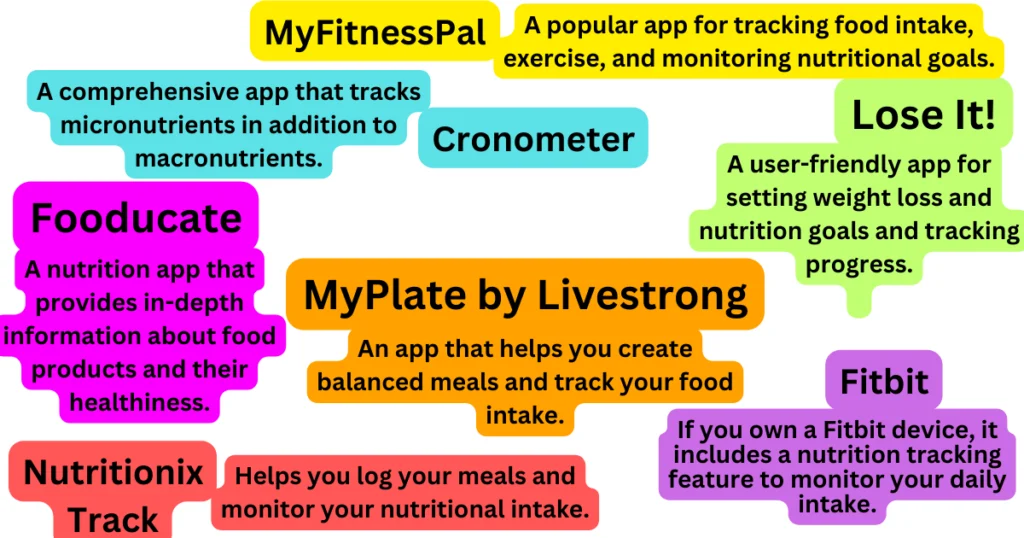
Remember that online tools and apps can be helpful for tracking nutrition and staying accountable, but they should complement rather than replace personalized guidance from a registered dietitian or nutritionist.
Utilizing these additional resources can enhance your understanding of women’s nutrition, provide ongoing support, and help you make informed dietary choices to achieve and maintain optimal health and well-being.
FAQ’s
Women’s nutrition refers to the dietary choices and habits that are essential for women’s health and well-being. It is crucial because proper nutrition supports physical health, hormonal balance, reproductive health, and overall quality of life.
Women often have unique nutritional needs due to factors like menstruation, pregnancy, lactation, and menopause. They generally require more iron and calcium, while men may require more protein and certain vitamins.
– Macronutrients are nutrients needed in larger quantities and include carbohydrates, proteins, and fats. They provide energy and are essential for bodily functions.
– Micronutrients are nutrients needed in smaller quantities and include vitamins and minerals. They play crucial roles in various bodily processes and support overall health.
Building a balanced diet involves including a variety of foods from different food groups, such as fruits, vegetables, lean proteins, whole grains, and healthy fats, in your meals. Portion control and mindful eating are also essential components of a balanced diet.
Some myths include thinking that all fats are unhealthy, that carbohydrates lead to weight gain, and that detox diets are necessary. It’s essential to rely on evidence-based nutrition information to avoid falling for these misconceptions.
Supplements may be necessary in certain situations, such as nutrient deficiencies or during pregnancy. Choose high-quality supplements from reputable brands that undergo third-party testing, and consult with a healthcare provider or registered dietitian for guidance.
Managing stress through mindfulness, stress-reduction techniques, and healthy coping mechanisms can help you avoid emotional eating. It’s important to address the root causes of stress and find alternative ways to deal with emotions.
Poor sleep can disrupt hormones that regulate appetite and lead to unhealthy dietary choices. To improve sleep, maintain a consistent sleep schedule, create a comfortable sleep environment, and limit screen time before bedtime.
You can find a registered dietitian through the Academy of Nutrition and Dietetics or seek recommendations from your healthcare provider. Ensure that the professional you choose has the necessary qualifications and credentials.
Yes, several apps and tools like MyFitnessPal, Cronometer, and Lose It! can help you track your food intake, exercise, and nutritional goals. However, they should complement personalized guidance from a healthcare provider or registered dietitian.
Remember that nutrition is a dynamic field, and it’s essential to stay informed about the latest research and recommendations to make the best dietary choices for your unique needs and goals.
